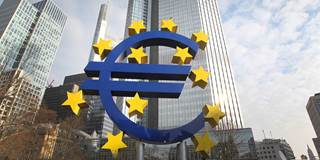Recently released data show that in 2017, the total current-account surplus for the 19 countries of the eurozone reached a record high. But while many commentators are now predictably calling on Germany to reduce its savings and boost investment, that advice ignores the role of the European Central Bank.
LONDON – In December 2017, the eurozone’s current-account surplus reached an all-time high of €391 billion ($483 billion), prompting the usual calls for Germany to “do more” to resolve the imbalance through fiscal policy. But such policy prescriptions are misguided, because they do not fully consider the role of the financial account in the balance of payments, or that of monetary policy in influencing international financial flows.

LONDON – In December 2017, the eurozone’s current-account surplus reached an all-time high of €391 billion ($483 billion), prompting the usual calls for Germany to “do more” to resolve the imbalance through fiscal policy. But such policy prescriptions are misguided, because they do not fully consider the role of the financial account in the balance of payments, or that of monetary policy in influencing international financial flows.